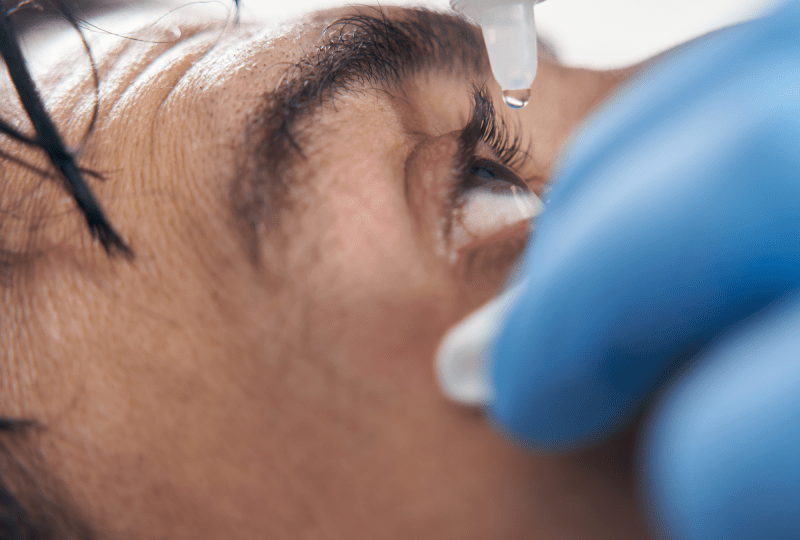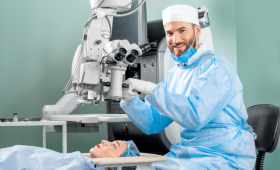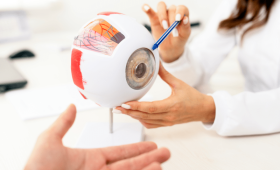What Is The General Success Rate of Cataract Surgery In Turkey?
The general success rate of cataract surgery in Turkey stands at 98% to 99% in patients without any additional eye diseases. This high success rate is achieved thanks to the experience of the surgeons, the use of the latest technology Phacoemulsification (Phaco) method, and high-quality intraocular lens (IOL) usage. The success of the surgery is measured not only by the removal of the cataract but also by a significant increase in the patient’s visual acuity compared to before the operation. The vast majority of patients report a noticeable improvement in their quality of life after the procedure.
What Are The Most Important Factors Affecting The Success Rate?
The most important factors affecting the success rate are the surgeon’s experience, the technology used, and the patient’s general eye health. An experienced surgeon is better able to manage unexpected situations that may arise during the operation. Modern clinics in Turkey use Phaco devices that allow for precise incisions and low energy use. Furthermore, the absence of accompanying eye diseases such as diabetes or glaucoma directly increases success by reducing the risk of complications. Detailed pre-operative assessment is critically important.
Why Is Phacoemulsification (Phaco) Method Considered More Successful?
The Phacoemulsification (Phaco) method is accepted as the most successful cataract surgery technique today due to its small incision, rapid recovery, and low complication risk. In this technique, the cataractous lens is fragmented with ultrasonic vibrations and aspirated, resulting in a very small incision of only 2-3 mm in the eye. Thanks to this small incision, the need for stitches is generally eliminated, and the risk of developing astigmatism is reduced. This advanced technology has become a standard practice in clinics in Turkey.
How Much Does Visual Acuity Increase After The Surgery?
The increase in visual acuity after surgery depends on the density of the cataract before the operation and the type of intraocular lens (IOL) used. Most patients who have their cataract successfully removed and do not have any retinal problems notice a significant improvement in vision quality within the first 24 hours after the surgery. Especially in cases in Turkey where smart lenses like Trifocal or EDOF are used, patients can achieve glasses-free clear vision at distant, intermediate, and near ranges. Final visual acuity is reached within a few weeks.
Are There Accompanying Diseases That Reduce The Success of The Surgery?
Yes, accompanying eye diseases such as diabetic retinopathy, glaucoma (eye pressure), macular degeneration, and corneal diseases can directly reduce the success rate of cataract surgery. These diseases limit the patient’s vision potential even if the cataract is successfully removed. Specialists in Turkey evaluate all these additional diseases in detail before the operation and inform the patient about realistic vision expectations. This is a vital step in treatment planning.
How Does The Type of Intraocular Lens (IOL) Used Affect Success?
The type of Intraocular Lens (IOL) used largely determines the aesthetic and functional success of the surgery. While Monofocal (single-focus) lenses only correct distance vision, smart lenses such as Multifocal, Trifocal, or EDOF (Extended Depth of Focus) allow the patient to see near and intermediate distances without glasses after the surgery. The selection of the correct lens suitable for the patient’s lifestyle in Turkey maximizes patient satisfaction after the operation.
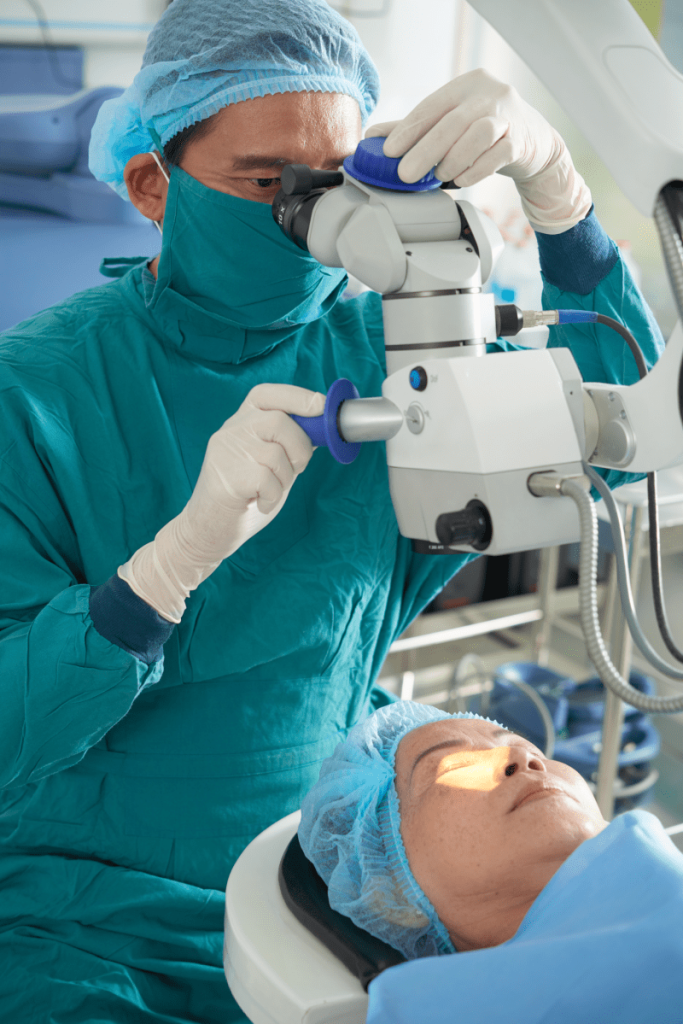
What Is The Risk of Complications After Cataract Surgery?
The risk of complications after cataract surgery is quite low thanks to modern techniques, generally less than 1%. The most common possible complications include intraocular infection (endophthalmitis, very rare), retinal detachment, and cystoid macular edema (retinal swelling). Early diagnosis and rapid intervention reduce the risk of these complications causing permanent damage. Strict protocols against these risks are implemented in clinics in Turkey.
Why Are High Success Rates Observed In Cataract Surgery In Turkey?
The main reasons for the high success rates observed in cataract surgeries in Turkey are the experience gained by doctors due to the high number of patients, large technological investments made in the health sector, and the existence of accredited hospitals serving at international standards. Furthermore, the quality of the lenses and consumables used is kept at the highest level in line with the demands of international patients.
Does Laser-Assisted Cataract Surgery (Femto) Increase Success?
Laser-assisted cataract surgery (Femto) minimizes human error and increases precision by performing some steps of Phaco surgery (corneal incision, capsulotomy, and cataract fragmentation) with a laser. Especially in patients where smart lenses are to be placed, the Femto laser perfects the positioning of the lens within the eye, potentially improving vision quality. However, the Phaco technique also has very high success in experienced hands.
Is It Necessary For The Cataract To Mature To Have Surgery?
No, it is not necessary to wait for the cataract to mature to have cataract surgery today. Surgery can be planned as soon as the cataract starts to decrease the patient’s daily quality of life. Early intervention facilitates surgery because the cataract is not yet too hard, allows the Phaco device to use less energy, and consequently reduces the risks of surgery. Modern medicine recommends that patients be treated earlier and more comfortably.
How Does The Success Rate Change In Diabetic Patients?
The success rate of cataract surgery in diabetic patients varies depending on whether their diabetes is under control and the condition of the retina. In well-controlled diabetic patients, the success rate is close to normal levels. However, in patients with diabetic retinopathy, even if the cataract is removed and visual acuity increases, the final vision expectation may be lower due to retinal damage. Detailed retinal evaluation is mandatory for these patients in Turkey.
How Serious Is The Risk of Post-Operative Infection (Endophthalmitis)?
Although post-operative infection (Endophthalmitis) is very rare (approximately less than 0.1%), it is one of the most serious complications and can cause permanent vision loss if not treated quickly. The risk of infection is minimized thanks to sterile conditions and protective antibiotics used during surgery. Accredited hospitals in Turkey implement the highest level of hygiene and sterilization protocols to prevent this risk.
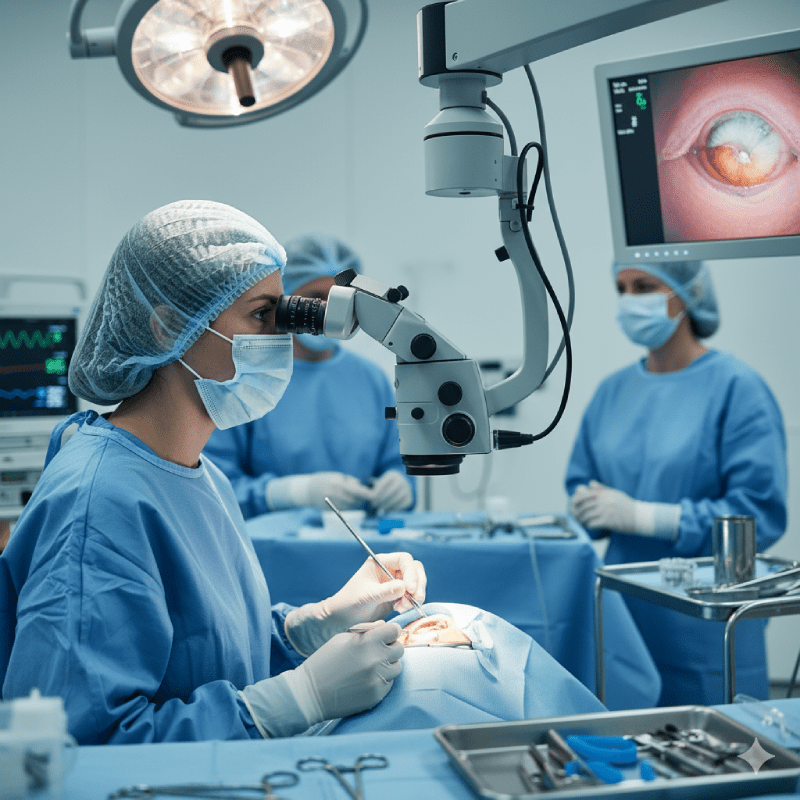
Does The Need For Glasses Completely Disappear After Surgery?
Whether the need for glasses completely disappears after the surgery depends on the type of intraocular lens (IOL) selected. Patients using Monofocal (single-focus) lenses achieve clear distance vision, but they still need glasses for near reading. Patients who prefer smart lenses like Trifocal or EDOF have an expectation of clear glasses-free vision at distance, intermediate, and near ranges. The use of smart lenses is quite common in Turkey, and glasses-free life is targeted.
How Much Does The Risk of Retinal Detachment Increase After Surgery?
Retinal detachment is a rare but potentially serious complication of cataract surgery. The risk of retinal detachment after surgery may increase slightly compared to the general population, especially in patients with high myopia. If early symptoms (flashing lights, floaters, a shadow over vision) are noticed, a doctor should be consulted immediately. Detailed retinal examination is performed before surgery for high myopia patients in Turkey.
Is There A Possibility Of Recurrence of Cataracts?
No, there is no possibility of a cataract recurring in the operated eye because the lens is completely removed and replaced with an artificial lens (IOL). However, in some patients, a clouding called secondary cataract (Capsular Opacification) may develop in the capsular bag behind the placed lens over time. This condition is easily and permanently treated with a painless YAG Laser procedure that takes seconds in an outpatient setting.
Why Is The Recovery Period Important For The Success Rate?
The recovery period is important for the final success of post-operative vision quality. Non-compliance with doctor’s instructions during the recovery period, such as rubbing the eye or lifting heavy objects, leads to complications such as infection, inflammation, or wound opening, thereby jeopardizing success. Post-operative care instructions in Turkey are provided in detail to ensure the fastest and safest recovery.
Is The Success of The Surgery Permanent Or Does It Recur?
The success of cataract surgery is permanent throughout the life of the implanted lens, and there is no possibility of the true cataract recurring. Intraocular lenses (IOLs) are made of long-lasting materials and do not wear out in the eye. The only “recurrent” situation of the surgery is the development of secondary cataract (capsular opacification), which can be easily corrected, as mentioned earlier. The lenses used in Turkey are internationally certified and permanent lenses.
How Successful Is The Precise Matching of Glasses Prescriptions?
The precise matching of glasses prescriptions depends on the accuracy of the biometry measurements taken before the surgery. Modern biometry devices and current formulas measure the structure of the eye with extreme accuracy. This precision in clinics in Turkey is an integral part of surgical success. Although the risk of the glasses prescription deviating from the target is low, small deviations can be corrected with thin glasses.
Are Cataract Surgery Success Rates Different In Children?
Yes, cataract surgery in children is a more complex process than in adults, especially due to the risk of amblyopia (lazy eye). Success depends on the timing of the surgical intervention and the meticulous application of post-operative glasses or patching therapy. Although the surgical success rate is high, long-term rehabilitation may be required to reach final visual acuity.
Can Multifocal Lenses Be Applied To Every Patient?
No, Multifocal (multifocal) lenses cannot be applied to every patient. Their success depends on the patient’s retinal and corneal health. Conditions such as severe macular degeneration, advanced glaucoma, or irregular astigmatism negatively affect the success of multifocal lenses. Specialists in Turkey mandate that the patient undergoes a detailed retinal and nerve screening before selecting a smart lens.
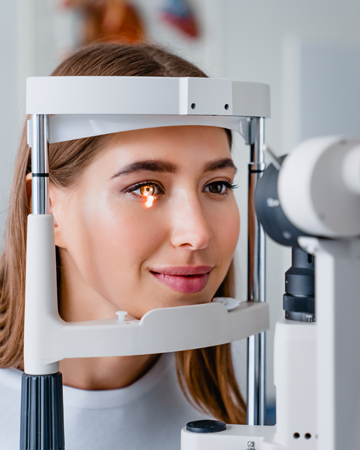
Is There A Risk of Bleeding During Cataract Surgery?
The risk of bleeding is very low as cataract surgery is an intervention performed on the superficial layers of the eye. The surgery is usually performed under droplet anesthesia and without bleeding. The risk of bleeding may increase, especially in patients using blood thinners or those with uncontrolled high blood pressure. Therefore, patients must discontinue blood-thinning medications under a doctor’s supervision before the surgery.
How Is The Risk of Developing Astigmatism After Surgery Managed?
The risk of developing astigmatism after surgery is low thanks to the small incision (Phaco) technique. If the patient has pre-existing astigmatism before the surgery, this condition is corrected simultaneously using Toric lenses. In Turkey, surgeons aim to further enhance the patient’s vision quality by correcting astigmatism during the operation.
Does Dry Eye Occur After A Successful Surgery?
Even after a successful surgery, temporary dry eye may occur. The small incision made during the operation can temporarily affect the nerves on the eye’s surface, reducing tear production and quality. This condition usually resolves within a few months, and patients are recommended to use artificial tear drops during this period. Clinics in Turkey offer supportive treatments to their patients in this regard.
What Are The Situations That Require Wearing Glasses Again After Cataract Surgery?
Situations that require wearing glasses again include: for near reading if a monofocal lens was preferred, the pre-existing astigmatism not being fully corrected, the targeted prescription showing a small deviation, or the development of a secondary cataract. Detailed measurements and smart lens options are offered in Turkey to minimize these risks.
How Is It Understood That The Surgery Was Unsuccessful?
Failure of the surgery is usually understood by vision not increasing to the expected level, severe pain, persistent redness, black spots (floaters) in the field of vision, or unexpected vision loss after the operation. Such symptoms indicate an emergency and require immediate intervention. Early intervention plays a critical role in preventing permanent damage.
Is There A Risk of The Intraocular Lens Dislocating During Surgery?
The risk of the Intraocular Lens (IOL) dislocating during or after surgery is very rare thanks to modern techniques and correct placement. The integrity of the capsular bag where the lens is placed is important. The risk may increase in cases where the capsular bag is weak. Experienced surgeons in Turkey meticulously place the lens in the correct anatomical position, minimizing the risk of dislocation.
Is Secondary Cataract Treatment (YAG Laser) Included In Success?
Secondary cataract treatment (Capsular Opacification) is seen as a common but easily treatable consequence of cataract surgery and generally does not affect the overall success of the surgery. This procedure, which restores vision quality, is an outpatient procedure that takes only a few minutes. This situation is considered a follow-up process, not a “failure” of the surgery.
What Should The Lifestyle Be Like For Successful Vision After Surgery?
For successful vision and long-lasting results after surgery, it is very important to protect the eye from water and dirt, avoid heavy lifting in the first week, use eye drops regularly, and not smoke. Reducing bright light and screen time initially, which strains the eye, also supports healing. Patients must learn all lifestyle recommendations in detail before leaving Turkey.
How Do Different Surgical Techniques Affect Success Rates?
Different surgical techniques (e.g., Phaco vs. Femto Laser) affect success rates minimally. Phaco (ultrasound) is the gold standard today and provides high success. The Femto Laser can further optimize success by increasing precision, but the biggest difference in final visual acuity is made by the surgeon’s skill and correct lens selection. Both techniques are applied with high success in Turkey.
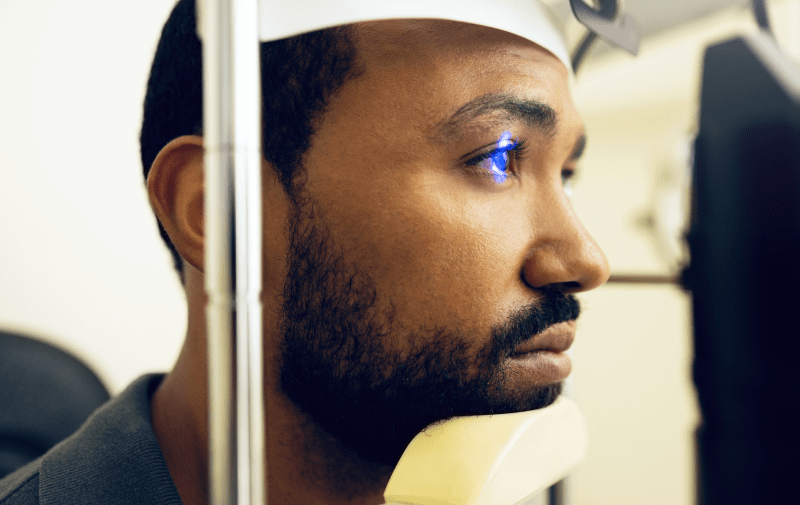
Does Eye Pressure Increase After Cataract Surgery?
Eye pressure may temporarily increase after cataract surgery. This usually happens due to some viscoelastic substances used during the operation remaining in the eye or due to inflammation. Physicians easily control this situation with pressure-lowering drops. Although the risk of developing permanent glaucoma is rare, it is very low, and more caution is exercised in patients with a pre-existing risk of glaucoma.
What Are The Success Risks In Patients With High Myopia?
Patients with high myopia (nearsightedness) are at a higher risk of developing retinal detachment and secondary cataract after cataract surgery. The peripheral retina may need to be checked in detail and weak areas strengthened with a laser before the operation. The surgeon aims to greatly improve vision quality by selecting an appropriate IOL that corrects the patient’s myopia.
How Important Is Antibiotic Use For The Success of The Surgery?
Regular and correct use of antibiotic drops is vital for the success of the surgery. These drops are used to prevent the most serious complication, intraocular infection (endophthalmitis). Patients are obliged to use these drops strictly according to the period and times determined by the doctor. Detailed instructions on this are given to patients in Turkey.
In Which Cases Can Surgery Be Canceled Or Postponed?
Surgery can be canceled or postponed in cases such as uncontrolled high blood pressure, high blood sugar levels, acute eye infection, or if the patient’s current general health condition is not suitable for surgery. The physician evaluates all risks and prioritizes the patient’s safety. Clinics in Turkey expect all these conditions to be met for a safe surgical environment.
When Do Swelling And Redness In The Eye Subside After Surgery?
Swelling and redness that may occur in the eye after surgery usually significantly decrease within a few days to a week. It may take several weeks for the eye to fully return to its normal appearance. Anti-inflammatory and steroid drops used during this process accelerate healing by keeping inflammation under control. Patients quickly regain comfort with the advice of their surgeons in Turkey.
Is The Success Rate Different In Elderly Patients Compared To Younger Ones?
The success rate of cataract surgery in elderly patients is not very different from that in younger people; age alone is not a risk factor. However, elderly patients may have a higher risk of accompanying systemic diseases (heart, blood pressure) and macular degeneration. Therefore, obtaining general health status and cardiac clearance before the surgery is important. Surgeons in Turkey increase the visual comfort of elderly patients with high success.
Cure Holiday For High Success And Reliable Solutions
Cataract surgery in Turkey is a treatment that rapidly improves quality of life, offered with world-class technology, expert surgeons, and competitive prices. However, the correct clinic, the right surgeon, and the correct lens selection are vital to guarantee the highest success rate.
Cure Holiday guides you in finding the centers in Turkey with the highest success rates and international accreditation, equipped with the latest technology for your cataract surgery. Contact Cure Holiday immediately to create your personalized treatment plan to minimize risks and maximize your vision expectations.
